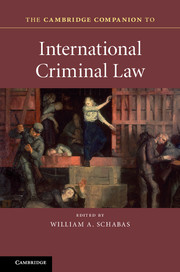Book contents
- Frontmatter
- Dedication
- Contents
- List of contributors
- List of abbreviations
- Introduction
- PART I PURPOSES AND PRINCIPLES
- PART II INSTITUTIONS
- PART III CRIMES
- PART IV TRIALS
- PART V THE FUTURE
- 17 The International Criminal Court of the future
- 18 Challenges to international criminal justice and international criminal law
- Index
- References
18 - Challenges to international criminal justice and international criminal law
from PART V - THE FUTURE
Published online by Cambridge University Press: 05 December 2015
- Frontmatter
- Dedication
- Contents
- List of contributors
- List of abbreviations
- Introduction
- PART I PURPOSES AND PRINCIPLES
- PART II INSTITUTIONS
- PART III CRIMES
- PART IV TRIALS
- PART V THE FUTURE
- 17 The International Criminal Court of the future
- 18 Challenges to international criminal justice and international criminal law
- Index
- References
Summary
In 1950, Professor Georg Schwarzenberger wrote an article expressing his doubts about the existence of international criminal law. In response, Professor Gerhard O. W. Mueller responded that international criminal law exists because it is being taught in universities. The Schwarzenberger approach reflects the positivist school, which in turn incorporates political realism. Thus, international criminal law exists only when States want it to exist. In other words, international criminal law does not exist per se – but only to the extent that States want it to exist and that this is reflected in positive international law. The proponents of the philosophical perspective advance the same claim for international law in general. This is the legacy of the 1648 Westphalian approach, which still lingers on in world affairs. The Mueller approach reflects the natural law philosophical approach, founded on higher values and overarching principles that should control State-action. These opposing views are both, to some extent, correct. Anything international is by its very nature conditioned by State interests and, maybe because of that, is sui generis and mostly ad hoc. But that does not mean that State interests always, and with respect to everything international, are devoid of or not subject to considerations based on higher values and enduring principles.
In the course of time, particularly after the Second World War, the establishment of the United Nations and the development of international human rights law, international law has sought to reconcile conflicting and competing State interests while at the same time identifying commonly shared interests that reflect certain higher values and enduring principles. As is evident from what follows, history does not repeat itself; precedents are not comparable and are not necessarily binding upon States’ future conduct. Yet somehow, since 1648, there is evidence that commonly shared values have influenced the collective decision-making processes of States, notwithstanding State interests. In contemporary times, this is evident in matters of international trade and other areas where the common and mutual interest of States exists. In fact, in those areas much progress has been made in collective decision-making. Not so, however, in other areas where such mutuality of interest is evident, as is the case in the fields of human rights, international criminal justice, and international criminal law.
By the Mueller postulate international criminal law and international criminal justice not only exist, but by now they are both doing very well.
- Type
- Chapter
- Information
- The Cambridge Companion to International Criminal Law , pp. 353 - 391Publisher: Cambridge University PressPrint publication year: 2016
References
- 3
- Cited by

